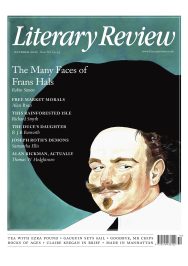Richard Vinen
Kim Kardashian of Westminster
Henry ‘Chips’ Channon: The Diaries, 1943–57
By Simon Heffer (ed)
Hutchinson Heinemann 1,168pp £35
Chips Channon was lucky. He was born rich and became even richer through his marriage into the Guinness family (and the family’s continuing generosity after his acrimonious separation from his wife, Honor). He moved from his native America to Britain in 1920 and was elected to Parliament. This meant that he had a ringside seat as the British government sought to appease Hitler, a policy that he supported, as well as during the Second World War, in which he took no active part. He seems to have been attractive to both men and women and he was fortunate that his relations with the former did not get him arrested (the need for discretion about homosexual relations partly accounts for the fact that the previously published version of these diaries was expurgated). He and historians have also been lucky that the Channon family have sponsored a full and sumptuously produced new edition of the diaries – this is the last of three volumes – and that Simon Heffer has devoted so much work to their editing. Heffer is a scrupulous scholar, whose austere erudition is relieved by flashes of malicious wit. His notes identify characters in the text, translate the French phrases that Channon so often drops into his writing and explain various features of British high society.
Are the diaries worth the labour that Heffer has lavished on them? In some respects, they are a disappointment. The foreword to this book, written by younger members of the Channon family, and the editor’s introduction both suggest that some of the entries may shock or offend. I doubt, though, that any reader who is sufficiently interested in mid-20th-century Britain to buy these diaries will be surprised to find that a man of Channon’s background sometimes expresses anti-Semitic opinions. As for the homosexual encounters, Channon drops many arch hints. He records that his bedroom looks as though it has been hit by a typhoon and wonders, ‘what could the servants have not thought?’ One evening, he anticipates ‘voluptuous sport’ and the next morning he recalls ‘a night of illicit love’. He even writes with Pooteresque precision of ‘mortal sin at 5.10’. But the only thing that we learn about what actually happens in bed is that the playwright Terence Rattigan (Channon’s one-time lover) snores.
More seriously, Channon was never that close to power. He knew Rab Butler, for whom he had briefly served as a parliamentary aide, but his contact with important politicians was mostly at second hand. He did not have the daily meetings with Churchill enjoyed by John Colville or

Sign Up to our newsletter
Receive free articles, highlights from the archive, news, details of prizes, and much more.@Lit_Review
Follow Literary Review on Twitter
Twitter Feed
It wasn’t until 1825 that Pepys’s diary became available for the first time. How it was eventually decrypted and published is a story of subterfuge and duplicity.
Kate Loveman tells the tale.
Kate Loveman - Publishing Pepys
Kate Loveman: Publishing Pepys
literaryreview.co.uk
Arthur Christopher Benson was a pillar of the Edwardian establishment. He was supremely well connected. As his newly published diaries reveal, he was also riotously indiscreet.
Piers Brendon compares Benson’s journals to others from the 20th century.
Piers Brendon - Land of Dopes & Tories
Piers Brendon: Land of Dopes & Tories - The Benson Diaries: Selections from the Diary of Arthur Christopher Benson by Eamon Duffy & Ronald Hyam (edd)
literaryreview.co.uk
Of the siblings Gwen and Augustus John, it is Augustus who has commanded most attention from collectors and connoisseurs.
Was he really the finer artist, asks Tanya Harrod, or is it time Gwen emerged from her brother’s shadow?
Tanya Harrod - Cut from the Same Canvas
Tanya Harrod: Cut from the Same Canvas - Artists, Siblings, Visionaries: The Lives and Loves of Gwen and Augustus John by Judith Mackrell
literaryreview.co.uk